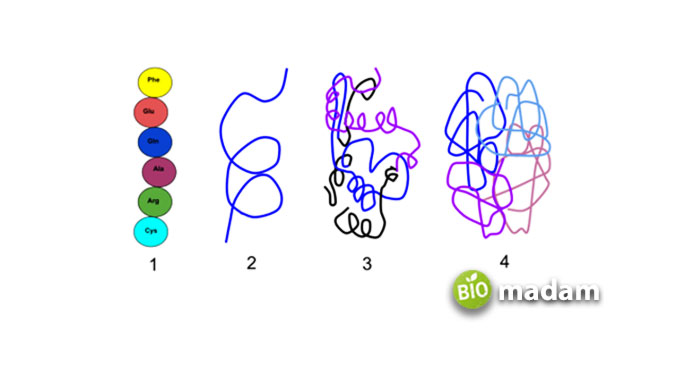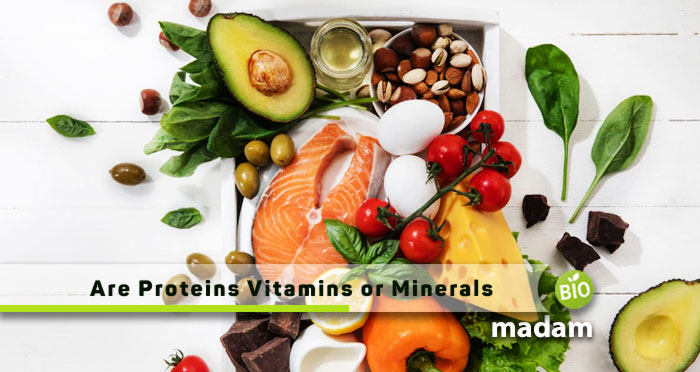Proteins are the building blocks of our body and make up all the cells and tissues in our body. They contribute to the development of the body, ensuring normal body functioning. However, there is often confusion if proteins are vitamins or minerals. They are neither vitamins nor minerals. Vitamins and minerals are micronutrients, while protein is a macronutrient. Let’s tell you more about proteins, vitamins, and minerals.
What are Proteins?
Proteins are one of the two types of nutrients in our body: micronutrients and macronutrients. Macronutrients are large, while micronutrients are smaller. The need for macronutrients is also more than for micronutrients. Besides proteins, carbs and fats are also macronutrients.

Properties of Proteins
Shape
Proteins can be fibrous or globular and found in different structures within the body.
Color and Taste
Proteins are typically colorless and tasteless. They are homogenous compounds.
Solubility
The solubility of proteins significantly depends on their pH. The solubility increases as the alkalinity or acidity increases.
Hydrolysis
Proteins can be hydrolyzed by various hydrolytic agents like HCl and NaOH or other acidic or alkaline agents.

Proteins vs. Vitamins vs. Minerals
Now that you know proteins are not vitamins or minerals, the question arises, how do they differ from each other? Keep reading to learn the differences between the three.
Definition
Proteins
Proteins are macromolecules that contribute the growth and development.
Vitamins
Vitamins are the essential organic compounds needed by the body in micro amounts.
Minerals
Minerals are micronutrients required by the body in small amounts.
Origin
Proteins
You can obtain proteins from animal sources like meat and plant-based proteins in the form of tofu, legumes, seeds, and grains.
Vitamins
Vitamins may be obtained from plant and animal sources such as carrots, potatoes, etc.
Minerals
Minerals come from earth sources and water reserves.
Functions
Proteins
Proteins contribute to growth and development and repair body muscles, different tissues, and organs.
Vitamins
Vitamins are critical for processing energy to carry out important functions within the cell.
Minerals
Minerals play a major role in maintaining body structure and helping muscle contraction.
Classification
Proteins
Proteins have several categories that are specified for different body functions. The two basic categories are fibrous and globular proteins depending on the shape of the proteins.
Vitamins
Vitamins are of 13 types, categorized into water-soluble and fat-soluble.
Minerals
Minerals are macrominerals and microminerals according to their need in the body.
Building Units
Proteins
The building units of proteins are amino acids that form polypeptide chains that produce different structures.
Vitamins
Vitamins constitute subunits known as vitamers that join to form the structure of vitamins.
Minerals
Minerals are formed by elements as their building blocks.
Molecular Size
Proteins
Proteins are macromolecules and range between 20,000 and 30,000 Da on average.
Vitamins
Vitamins are smaller in size and may weigh a few hundred Daltons.
Minerals
Minerals vary in size and weight depending on their time to grow.
The Bottom Line
Proteins are distinct from vitamins and minerals in various aspects. Their origin, weight, and role in the body differ majorly from the role of vitamins and minerals. Proteins are macromolecules required by the body to produce structures within the body and contribute to enzymatic reactions to ensure body physiology. On the other hand, vitamins and minerals are smaller compounds known as micronutrients and are required in lesser amounts in the body.

Meet me; I am Paulina Zaniewska, who’s more hooked on providing the best health blog. I’ve always been so determined to compete as a nutritionist, and here I am, done with a Master’s in food technology. My brilliant performance throughout encouraged me to help people.

